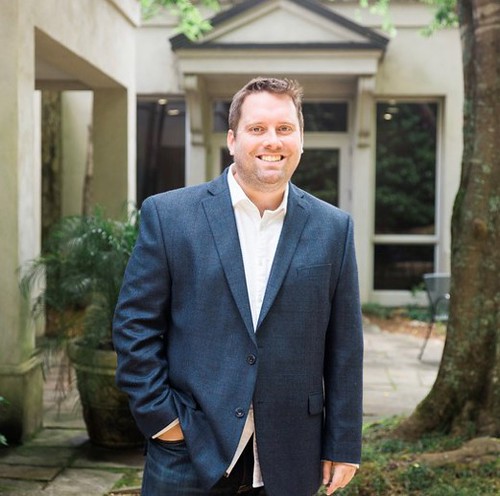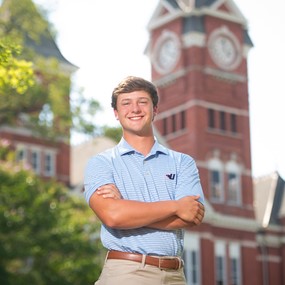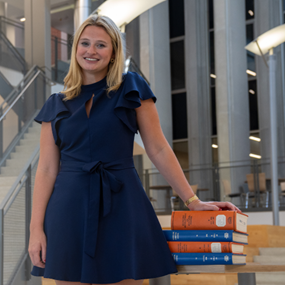Public relations alumnus riding high with first Rolling Stone article, book about Birmingham music scene

Blake Ells has been through a lot.
The 2004 public relations graduate not only has survived the uncertainty of the freelance writing world, but also the COVID-19 pandemic, a tornado and even being hit by a car. The 38-year-old Rogersville, Alabama, native has persevered and begun to thrive, celebrating the release of his second book in October and landing his first Rolling Stone byline on May 3.
For Ells, a music fanatic who has seen “thousands” of live shows at venues large and small across the country, music has been a passion since his teen years. He worked at Auburn University’s student-run radio station, WEGL, during his college days, an experience that led him to an array of radio jobs as a young professional at places like WJOX in Birmingham before transitioning to public relations in the nonprofit sector.
Now, Ells balances his work for the nonprofit Grace Klein Community with his music writing endeavors, and he is riding a nice wave of momentum heading into the summer. His second book “Magic City Rock: Spaces and Faces of Birmingham’s Scene” by The History Press, was released late last year, and he is looking forward to seeing more live shows as the nation continues its march toward a return to normalcy amid the COVID-19 pandemic.
Ells—who serves on the Alabama Symphony Orchestra Junior Board—has been published on AL.com and in The Birmingham News, Birmingham Post-Herald and Birmingham Magazine, among others. The Birmingham resident took time out of his increasingly busy schedule to talk about everything from his nearly 20 years of experience since graduating from Auburn, what he loves so much about music and the process of writing books, to advice for current students and his plans for the future.
OCM: Give us a capsule look at your time at Auburn.
Ells: I got a BA in public relations, with a focus in journalism. My first foray into media was in radio, and I worked at WEGL for a couple years. I actually had an on-air shift at WEGL on 9-11. A year or so later, I went across town to WTGZ 95.9 and did a Locals Only radio show that was an hour on Friday and Saturday nights. I would play music from Lee County and the Montgomery area, have bands on and interview them.
OCM: Talk about your career, starting in the early years after graduating from Auburn.
Ells: It’s been a weird weave in and out of sports and music for me over the last 20 years. My internship when I was a senior at Auburn was at WJOX here in Birmingham, and that turned into a full-time job that went on about five years. I produced all of the midday programming, and when we broke into two stations, 94.5 and 690, I went into the evening show on the AM station and did that for a couple years until the recession hit and Citadel [Broadcasting Corporation] went bankrupt. That’s when I shifted and started down the path I’m on now.
I spent eight years with Friends of Birmingham Botanical Gardens and have been with my current nonprofit for a little over a year. Friends was the nonprofit 501(c)3 that did educational fundraising. I left there in 2018, worked exclusively off freelance and finished my second book. Then, the pandemic hit, and I decided I needed to get something a little more stable and ended up back in nonprofit communications.
OCM: Seems like you’ve found a good balance between working for nonprofits and freelancing about music.
Ells: I’ve been fortunate to be able to manage working in nonprofit communications and having bosses who are OK with me doing freelance like Rolling Stone and writing books. I can’t complain. I’ve had a pretty good 10-year run on this side of media.
OCM: How did the Rolling Stone article come about?
Ells: One of the main editors over there has been a friend of mine for a long time. He’s actually an Auburn graduate, too, and I think he finished in the College of Business. His name is Jon Freeman, and he’s over at Rolling Stone Country, which is Nashville-based. He had tried to figure out a way for me to do a story for Rolling Stone earlier. I forget who the artist was, but someone was beginning their tour here in Birmingham and he wanted me to cover it, but I was out of town at another show or festival and couldn’t.
Then, this festival came around, and I’ve always had a good relationship with them in Key West. They like me and what I do, and I’d covered it for a couple of blogs like Nashville Noise. It occurred to me that this was going to be one of the first festivals back after the pandemic, and maybe this was a way I could finally get that byline. Freelance and everything like that has dried up, but this was a unique situation where I was going anyway and they weren’t going to pay someone to travel down there to cover it. They were happy with how things turned out, and so was I. It just worked out beautifully, and I’m hopeful it will happen again soon and often.
OCM: It must have been quite a thrill for a music fanatic like yourself to find out you were going to have an article published by Rolling Stone. What was that like?
Ells: When I was a senior in high school and was in my AP English class, we were doing an exercise where we’d read descriptors and everyone in the class would vote who was the best fit for it. One of them was, “This person will be writing for Rolling Stone one day,” and everyone said “Blake.” So, it’s obviously been something I’ve always wanted to do. I followed life as it was dealt and ended up in sports media for a long time, but somehow was able to shift back where I could do music stuff. I had already published two books when it happened, and there’s something that actually feels easier about getting a book deal than getting published in Rolling Stone. It’s not easy. It was a really, really proud moment. My folks were equally as proud, and I think they were as proud of that as they were for anything I’ve done, short of graduating from Auburn.
OCM: What has been your draw to the nonprofit realm, just the desire to give back to the “greater good” of humanity?
Ells: Yes, and it’s worked out and is a good fit because the Rolodex is kind of large and I know people and know how to get a message across. The first nonprofit work I did with the Gardens was about educational fundraising for inner-city kids, and we provided a curriculum-based science education to elementary- and middle school-aged kids in the Birmingham area for free. With Grace Klein Community, the organization I’m working with now, we do food rescue. Our main goal right now is to get businesses, grocery stores or whomever to not throw food away just because of expiration dates. We can come in, save that food and get it to people who are hungry. There are not millions of dollars in the nonprofit world, but it’s rewarding, it’s steady and it’s reliable. It makes me feel good, and there’s still the option to pursue the other things, too.
OCM: Tell us about your second book, “Magic City Spaces: Spaces and Faces of Birmingham’s Scene.”
Ells: Birmingham has always had a kind of DIY rock scene. There’s been plenty written about Birmingham’s jazz and blues scene, and I didn’t really think I was going to add a lot to that conversation. But I don’t think people really think that much about Birmingham as a rock ‘n’ roll town, so telling that story was my goal with the book. I basically drew a straight line through the ‘70s and ‘80s days of bands like Hotel and Telluride to currently what is commercially the most successful band to ever come out of Birmingham rock-wise, which is St. Paul and the Broken Bones. You can kind of trace that as one long, straight line, and everybody was intertwined and playing in the same bands.
I had done the first book, “The Muscle Shoals Legacy of FAME,” about Muscle Shoals, which is near my hometown of Rogersville. I wanted the two books to complement each other as the two places I had spent most of my life.
OCM: Can you talk about the process of writing a book and how monumental of a task that is?
Ells: They were both really different, and neither one was encyclopedic. These are both pretty light reads, and neither one are 400-page books. They are oral histories recorded on the printed page, and the way I approached them was I wanted to talk to all of the people who were involved in both scenes, let them tell their own stories and try to figure out a way to patch those stories together into one narrative. The first book was a lot more interconnected, and there was a lot more carryover, so there was a lot more sitting down for hours-long sessions just hammering it out. There was a lot of transcribing, and that part’s not always fun.
I really looked more at the new one as a series of vignettes that aren’t necessarily connected. Each chapter can kind of stand alone as its own newspaper feature article, really. There’s some connectivity between them, and there is that line I talked about, but at the same time, there were two or three chapters in there that were repurposed from feature articles I did for local alt weeklies or other publications. I think I wrote a chapter that was 12 or 13 chapters deep that ended up getting shuffled up to the start. I really pieced it together and made it work chronologically the best I could. They were two very different approaches to get to the same place, and the second was a little bit tougher. It all worked out though, I was proud of it and it was well-received. It’s tough to release a book during a pandemic, because we couldn’t do signings and conversations in person.
OCM: Talk about your music roots, when your mother, Denise, would drive you and your friends to concerts in Birmingham while you were in high school.
Ells: We grew up in extremely rural Alabama, and my mom and dad [Mike] didn’t want us driving to Nashville, Birmingham or Atlanta for concerts. My mom especially was like, “If you boys pitch in and buy my ticket, I’ll drive you.” Mom—also an Auburn graduate and part of the Class of 1980—has walked across police picket lines to watch Rage Against the Machine, would hang out at the sound board at Blink 182 concerts and score free water from the sound guys and was all about going to rock shows with us. She did the same thing 10 years prior at Jordan-Hare Stadium, standing outside the locker room with me to get all those players to sign a white-paneled football. She always did things like that for us.
OCM: What do you love most about music? Where does your passion for it come from?
Ells: It sounds like a cliché, but it’s always been an escape. It’s always been something I can rely on, and sports hasn’t always been able to do that. Music never really has a down year, and there’s always something good out there. There’s always something new to listen to and new to inspire you.
Jason Isbell wrote the foreword for my first book, and I’ve been a huge fan of his for a long time. We grew up about 20 minutes apart in north Alabama, and he’s become an acquaintance of mine. I had never really been far from home and decided to go see him play in New York City in my first trip there. That kind of became a thing, and it went from going to one show in New York City to going to Red Rocks [in Colorado] or Los Angeles to see him play. I think now we’re at 22 states I’ve seen him play. That’s become a big part of it the last five or six years—it’s given me an excuse to go see parts of the world I otherwise wouldn’t have. It’s a reason to have a place to go, and at the end of the night, it’s something comfortable and familiar. With music, unlike something like Auburn football or basketball, there’s not a chance you’re going to lose and have a long plane ride home.
OCM: How many shows do you estimate you’ve seen through the years?
Ells: I’ve been to literally thousands of concerts. It’s a really absurd amount. I’ve got a couple notebooks I’ve had for 22 years that are filled with every artist I’ve seen, every artist I’ve met and notes on all of them. I worked a summer job at a steel mill in Decatur, Alabama, when I was 16 and was working 40 hours a week and making pretty good money. I was 16 and didn’t really need a lot of money for bills, so that started things with me going to concerts. I would just buy concert tickets, and there wasn’t anything to do in my small, little town, so we would just go to concerts.
OCM: Is it true you were hit by a car while walking across the street in Birmingham?
Ells: Yes. It was in 2014, and I was on foot in Five Points. It was the middle of the day, I was totally sober and was walking across the street to go to a bar to watch the AFC Championship Game on a random day in January. A girl hit me, and I barely had any time to react, but braced myself. Her bumper hit me right on the left knee cap, and when it did, I hopped up on her hood. We made eye contact while I’m hanging on her hood, and I’m screaming and she’s screaming. She stopped, and I slid right off, tried to stand up and couldn’t. There’s a big rod in my leg now, and I couldn’t walk for about four months and had to do a long physical therapy rehab.
I was also inside a house that was hit by the April 27, 2011, tornado that came through Birmingham, so it’s been quite a ride.
OCM: Based on your career experiences, what advice would you give public relations and journalism majors here at Auburn?
Ells: Who you know goes about just as far as anything else in this life, and don’t discount people you meet along the way. I really appreciate someone like Professor John Carvalho, not so much for what we had in class, but the relationship we’ve had since and the fact that he’s always been someone I looked up to and could rely on and could ask for advice. If there’s someone like that in your life at your school or college, a professor or teacher, nurture that relationship and don’t take it for granted. Make sure you stay in touch with those people and rely on them, because 20 years down the road, you’re still going to be glad you have that relationship.
One thing people say advice-wise, especially in media fields, is that you’ve got to do a lot of things for free. Looking back on it now, I would make sure that a 20-year-old kid would know it’s OK to do things for free while you’re in school, but when you get out, you need to quickly start valuing your work and figuring out what your own worth is. For some reason, people think that things like writing, graphic design and whatever else is just “good exposure,” like a band playing a wedding. You need to put a value on that work, because promises and hoping doesn’t put food on the table.
Also, I don’t know what a cheap wing night costs there in Auburn anymore, but enjoy those wing nights and don’t take for granted the time you have in that town where things are really dirt cheap.
OCM: How about advice regarding how doing good work and establishing a strong reputation can open doors for you down the road?
Ells: That’s really what I’m experiencing right now because of this Rolling Stone piece. I’ve spent about a decade just picking and picking and picking at being able to make a living off writing about music. We’re not there yet, and it’s going to be a while before I’m able to quit my day job, but it’s finally at a point where there are a couple of other major country music publications and such that I may have some opportunities to work with. Freelancing’s not always fun. It can be if you can get enough work, but with the pandemic, it’s been a challenge.
There definitely have been some other things that have been popping up since the Rolling Stone thing, and I’m hopeful I can seize those. For the past two years, at least, I’ve done most of the things I’ve done because of my name and not because I’ve had a ton of bylines. I spent a lot of time writing for AL.com covering music for them, and that’s probably one of the top 100 sites in America. That was definitely a huge byline, but as far as getting out of that bubble and getting national bylines, the Rolling Stone thing has definitely opened new doors.






